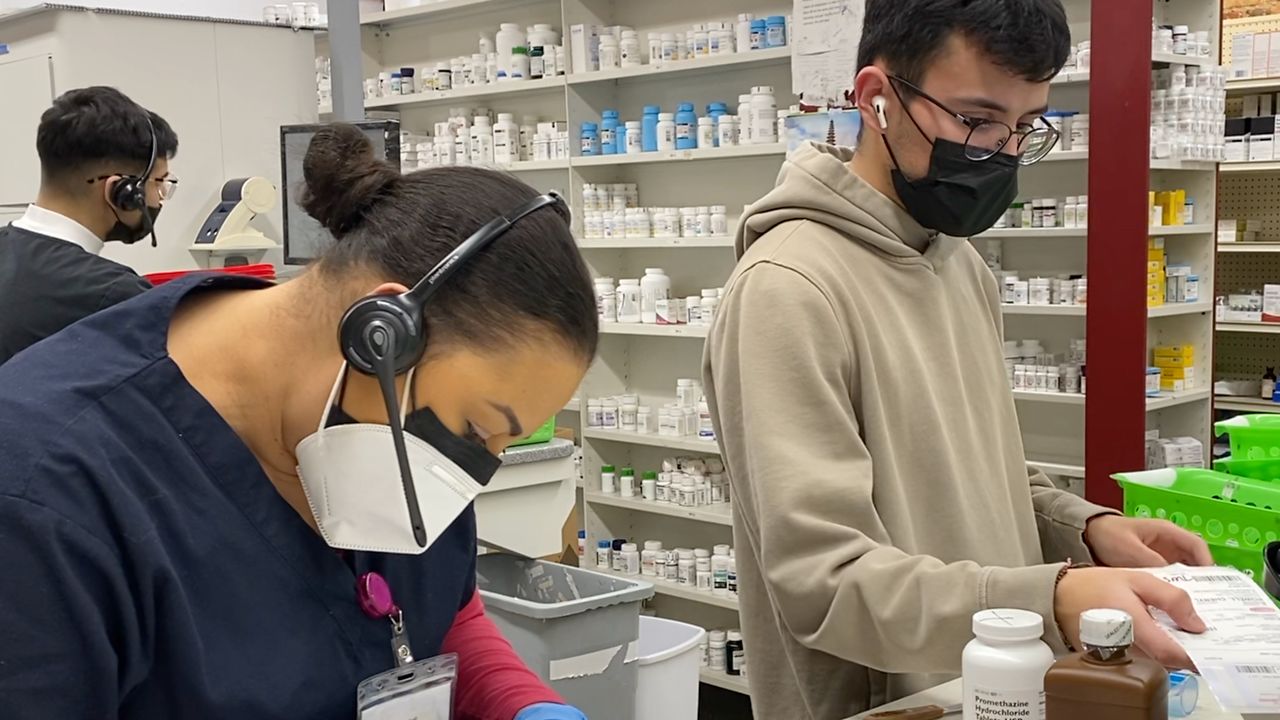COLUMBUS, Ohio — An increasing number of COVID-19 testing locations are offering oral pill therapeutics to eligible patients who test positive, but some sites said the lack of interest in the medicine disappointed them.
What You Need To Know
- COVID-19 oral antiviral therapeutics are available at testing sites
- A new database shows the locations participating in the program
- Providers report little interest from patients in the live-saving drugs
Locations taking part in the federal government’s “Test to Treat” program include pharmacy-based clinics, health centers and long-term care facilities. The Department of Health and Human Services launched a database on March 30 to help Americans locate therapeutics, and it includes more than 2,000 locations that are taking part in Test to Treat.
The locations are offering Pfizer’s Paxlovid, the preferred oral antiviral treatment, and Merck and Ridgeback’s drug Molnupiravir, both of which have been shown to reduce the chances of severe disease and death.
At a health center in Lima, Ohio, Health Partners of Western Ohio’s Quick Care, most eligible patients do not want the oral pills, Chief Clinical Officer Dr. Warren Morris said.
“We really thought there’d be a lot more interest,” he said. “Most are declining the medication when offered, and I honestly don’t know why.”
Morris said they’re seeing hesitancy similar to what they’ve seen from patients who were eligible for monoclonal antibody drugs, which were the primary treatments for outpatients earlier in the pandemic. “No amount of explaining will change their minds,” he said.
Despite the lack of interest so far, Morris said Health Partners is proud to be offering free COVID-19 testing and treatment, as one of only a handful of locations in Ohio taking part in the federal program that isn’t a chain pharmacy. Most of the taking part sites are CVS, Walgreens and Kroger locations with clinics staffed by a nurse practitioner or a physician assistant.
“The medications seem to be very, very well tolerated from what we can tell, and they’re reasonably effective,” he said.
The drugs are approved for high-risk COVID-19 outpatients — those 65 and older and individuals with certain health conditions — and they must be taken within five days of symptom onset. The regimens involve taking a few pills per day for five days.
Beyond the Test to Treat program, many other providers are dispensing prescriptions for antiviral pills, but most locations either don’t have on-site testing or don’t have an on-site prescriber, which could be a physician, an advanced practice registered nurse, or a physician assistant. Eligible patients who test positive are encouraged to talk to a health professional about the medication.
Health associations have quarreled over how the medication should be prescribed to positive patients. The American Medical Association came out in opposition to the current protocols last month.
“Establishing pharmacy-based clinics as one stop shopping for COVID-19 testing and treatments is extremely risky. Pharmacy-based clinics typically treat simple illnesses such as strep throat. Yet, COVID-19 is a complex disease and there are many issues to consider when prescribing COVID-19 antiviral medications,” the association said in a statement.
The American Pharmacists Association contended in a statement that the current plan is too narrow and advocated for pharmacists to prescribe the medication.
Pharmacist Denise Conway, who owns two independent pharmacies in Ohio, said the program could have a significant benefit if there is another COVID-19 surge. One of her locations, Conway Pharmacy in Danville, Ohio, is taking part in Test to Treat, but they haven’t had an eligible patient test positive since they received their supply of Paxlovid a few weeks ago.
“There hasn’t really been a need yet,” she said. “We’re kind of in a lull of any positive COVID tests.”
The pharmacy is next door to a federally qualified health center, and Conway said they are working together so that a patient can get a prescription from a provider at the health center if they test positive at the pharmacy. The pharmacy would then dispense the prescription.
Conway Pharmacy is also working on a partnership with a telemedicine provider to add another option for patients to get prescriptions on site.
Conway said the pharmacy will get modest payments from insurance companies for dispensing the pills, and the federal government pays for the medication. She said it takes 30-45 minutes of a pharmacist’s time to go through the workup process for oral antiviral pills because they have to conduct a thorough review because of possible drug interactions.
“Pharmacies are lucky to get $15, and so to be quite honest, that’s the discouraging part, and that’s why some pharmacies are like, ‘Nope, not doing it,’” she said. “That’s a ton, a ton of time to put into one prescription and just making sure everything is correct.”
Conway said she wanted her pharmacy to take part because she sees it as a unique opportunity to expand access in a rural area, and she fears we have yet to see the last COVID-19 surge.



